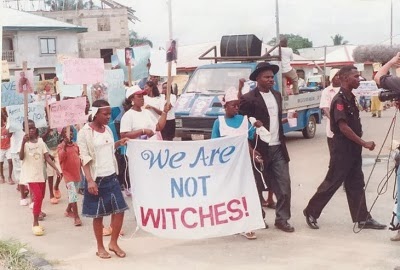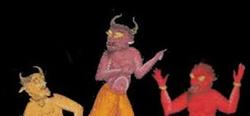
By Sharon Hill
As part of my daily news reviews, I come across some particularly disturbing events where women are the target of severe abuse, even death, by those wielding the cowardly tool of superstitious nonsense. I suspect it’s not more prevalent than decades ago but the Internet reveals it in all it's shocking color worldwide. In the 21st century, it is appalling that several areas of the world devalue and subjugate women in such ways, still, after all this time and supposed “progress” in other places around the world.
Poverty, lack of education, religion — these factors suppress women and disadvantage them in society. Advocates for women often feel discouraged because the problem is so huge; one person feels too small to do anything about it. I feel the same. I am not qualified to speak about women’s rights worldwide, but what I notice as a consumer of news are two practices that have, in the past year, caught my eye as notably destructive and astoundingly ignorant - persecution for witchcraft and belief in spirit possession. These beliefs remain alive and very dangerous in many areas of the world. Is there anything we can do to stamp them out?
As part of my daily news reviews, I come across some particularly disturbing events where women are the target of severe abuse, even death, by those wielding the cowardly tool of superstitious nonsense. I suspect it’s not more prevalent than decades ago but the Internet reveals it in all it's shocking color worldwide. In the 21st century, it is appalling that several areas of the world devalue and subjugate women in such ways, still, after all this time and supposed “progress” in other places around the world.
Poverty, lack of education, religion — these factors suppress women and disadvantage them in society. Advocates for women often feel discouraged because the problem is so huge; one person feels too small to do anything about it. I feel the same. I am not qualified to speak about women’s rights worldwide, but what I notice as a consumer of news are two practices that have, in the past year, caught my eye as notably destructive and astoundingly ignorant - persecution for witchcraft and belief in spirit possession. These beliefs remain alive and very dangerous in many areas of the world. Is there anything we can do to stamp them out?
 A "sorceress" is burned alive in Papua New Guinea as the rest of the village looks on.
A "sorceress" is burned alive in Papua New Guinea as the rest of the village looks on. In the 2000 book, Raising the Devil, Bill Ellis describes how the act of identifying individuals and naming the social threat gives a sense of power over chaotic situations. This transforms the event for better or worse. People who are "deviant in economic, political and gender roles bear the brunt" of witch crazes and panics.
Witchcraft accusations of centuries ago belong in the history books of the U.S and Europe as examples of social oppression and scapegoating. And yet, we see naming, shaming, beatings, and killing in the name of witchcraft in various African nations and in Papua New Guinea every week. They may happen every day. In contrast, the Salem witchcraft trials only lasted one year, 1692, and took the lives of only 19 people.
The majority of witch hunters are young men. The majority of victims are women.
In Tanzania, between 2004 and 2009, more than 2,585 older women were killed in eight regions of the country because of alleged witchcraft. Though the laws changed, the cultural shift will be slow especially in rural areas. Earlier this month, seven people were attacked and burned in Tanzania, accused of witchcraft. The government arrested several but the problem will continue until more proactive actions are taken including education and methods to discourage destructive superstitious beliefs that condone horrific violence.
Central Africans consider sorcery as the cause of many misfortunes. The Central African Republic’s interim president, a woman, says, “Witchcraft is real”. Some 60 percent of female prisoners were sent to jail for witchcraft.
In Ghana, women are exiled as witches. They live in camps together, run out of their villages in fear of death. Most of them were accused of witchcraft after their husbands died suggesting that witchcraft accusations are a way for the family to take control of the widow's property and get her out of the way - a sad reflection of a widow’s position in this society.
There are dozens of media reports from these countries as well as Zambia and Zimbabwe. Too many to count. When folk traditions remain, still serving a purpose socially or politically, a mass persecution can result. We are seeing this in parts of Africa and in Papua New Guinea. Horrific violence occurred in PNG last year as women were beheaded and burned alive for witchcraft accusations linked to economic inequalities. The United Nations documented hundreds of cases of such violence in Papua New Guinea in recent years and assume many more go unreported. Until recently, one could use accusations of sorcery as a legitimate defense for crimes. Even though the law changed, the belief will take a long while to work its way out of the fabric of society.
Belief in witchcraft is returning to modern countries as well. A man in Queens killed a mother and daughter with a hammer believing they were witches who were casting spells on him.
As a demonstration of the power of such belief in black magic, young girls in Nigeria were put through a “juju” magic ritual to control them and make them fearful of their captor who sold them into the U.K. sex trade. Their fear of the magic was so great that they dare not run away but must obey.
In Islamic communities, we see a rise in diagnosis of jinn (djinn) possession in women. Jinn, or djinn, are supernatural entities mentioned in the Quran supposedly made of smokeless fire. They ared seen as evil spirits that harm humans. Associated with madness, Muslim societies traditionally accept jinn as the cause of mental illness and epilepsy.
The news stories that are emerging containing reference to jinn possession are harrowing.
Witchcraft accusations of centuries ago belong in the history books of the U.S and Europe as examples of social oppression and scapegoating. And yet, we see naming, shaming, beatings, and killing in the name of witchcraft in various African nations and in Papua New Guinea every week. They may happen every day. In contrast, the Salem witchcraft trials only lasted one year, 1692, and took the lives of only 19 people.
The majority of witch hunters are young men. The majority of victims are women.
In Tanzania, between 2004 and 2009, more than 2,585 older women were killed in eight regions of the country because of alleged witchcraft. Though the laws changed, the cultural shift will be slow especially in rural areas. Earlier this month, seven people were attacked and burned in Tanzania, accused of witchcraft. The government arrested several but the problem will continue until more proactive actions are taken including education and methods to discourage destructive superstitious beliefs that condone horrific violence.
Central Africans consider sorcery as the cause of many misfortunes. The Central African Republic’s interim president, a woman, says, “Witchcraft is real”. Some 60 percent of female prisoners were sent to jail for witchcraft.
In Ghana, women are exiled as witches. They live in camps together, run out of their villages in fear of death. Most of them were accused of witchcraft after their husbands died suggesting that witchcraft accusations are a way for the family to take control of the widow's property and get her out of the way - a sad reflection of a widow’s position in this society.
There are dozens of media reports from these countries as well as Zambia and Zimbabwe. Too many to count. When folk traditions remain, still serving a purpose socially or politically, a mass persecution can result. We are seeing this in parts of Africa and in Papua New Guinea. Horrific violence occurred in PNG last year as women were beheaded and burned alive for witchcraft accusations linked to economic inequalities. The United Nations documented hundreds of cases of such violence in Papua New Guinea in recent years and assume many more go unreported. Until recently, one could use accusations of sorcery as a legitimate defense for crimes. Even though the law changed, the belief will take a long while to work its way out of the fabric of society.
Belief in witchcraft is returning to modern countries as well. A man in Queens killed a mother and daughter with a hammer believing they were witches who were casting spells on him.
As a demonstration of the power of such belief in black magic, young girls in Nigeria were put through a “juju” magic ritual to control them and make them fearful of their captor who sold them into the U.K. sex trade. Their fear of the magic was so great that they dare not run away but must obey.
In Islamic communities, we see a rise in diagnosis of jinn (djinn) possession in women. Jinn, or djinn, are supernatural entities mentioned in the Quran supposedly made of smokeless fire. They ared seen as evil spirits that harm humans. Associated with madness, Muslim societies traditionally accept jinn as the cause of mental illness and epilepsy.
The news stories that are emerging containing reference to jinn possession are harrowing.
 Potrayal of a "jinn"
Potrayal of a "jinn" An entire family of four was found gully of murder 21-year-old pregnant Naila Mumtaz in Birmingham, England this past September. The family was conditioned to see spiritual possession as a "catch all" for any problems. A friend of the Pakistani family said this: "The Jinn concept is used to keep society in its place. If somebody isn't behaving correctly, maybe somebody's behaviour is very extreme, it could be due to some mental illness, or physical disability or something like that, people will turn around and say 'it's Jinn. Jinn has done this to her or him'."
Mumtaz could have been suffering from a mental illness or under severe stress – she was pregnant, in an arranged marriage, away from her native country and her husband was disabled. Yet, it was jinn that caused this? Hardly.
In the United Arab Emirates, a man divorced his wife because she wouldn't have sexual relations with him. Her family says she is possessed, so he sues for divorce (in a Sharia court). She is found at fault for deception because she didn’t tell him she had a jinn. She gets no monetary support after the split. What does she do? Where does she go? I can rattle off possible other explanations at play besides evil spirits for this catastrophe.
Health care professionals in Scotland report that at a Muslim women’s care center, they are seeing a marked increase in women attributing their mental, physical and social problems to jinn. Are these women getting the health treatment that they need? Or do they think exorcism alone will do the trick?
The British Asian community still holds that mental health problems are caused by the supernatural. They seek hidden healers instead of psychological help. They believe jinn can trick modern practitioners and that victims need only spiritual help. These healers are responsible for deaths of several young women.
In 2013, a healer in Yemen was arrested after he reportedly trampled on woman’s neck, reciting from the Quran, in order to exorcise her demon. She was 23 years old, newly married, and was brought to the spiritual doctor for psychological problems.
Last July in Pakistan, a 24-year old woman suffering from undiagnosed problems, was reportedly beaten to death by a Muslim holy man who was trying to “exorcise demons” from her. Her family had consulted doctors to no avail. The Sufi elder believed he could confront “the demons tormenting her” with the treatment. In 2012, a 13-year-old girl was killed after a holy man also tried to rid her of “demons” through torment by blocking her nose and throat with cotton.
An 18-year old woman was brought to a hospital in Kerala, India, dead. The doctor noticed burns on her body consistent with the ritual of exorcism. Police are investigating the family. The same news outlet reports that, back in July, a woman in Karunagapally in Kollam district died “due to black magic” and in August a pregnant woman in Ponnai, Malappuram, “had met the same fate.”
Mumtaz could have been suffering from a mental illness or under severe stress – she was pregnant, in an arranged marriage, away from her native country and her husband was disabled. Yet, it was jinn that caused this? Hardly.
In the United Arab Emirates, a man divorced his wife because she wouldn't have sexual relations with him. Her family says she is possessed, so he sues for divorce (in a Sharia court). She is found at fault for deception because she didn’t tell him she had a jinn. She gets no monetary support after the split. What does she do? Where does she go? I can rattle off possible other explanations at play besides evil spirits for this catastrophe.
Health care professionals in Scotland report that at a Muslim women’s care center, they are seeing a marked increase in women attributing their mental, physical and social problems to jinn. Are these women getting the health treatment that they need? Or do they think exorcism alone will do the trick?
The British Asian community still holds that mental health problems are caused by the supernatural. They seek hidden healers instead of psychological help. They believe jinn can trick modern practitioners and that victims need only spiritual help. These healers are responsible for deaths of several young women.
In 2013, a healer in Yemen was arrested after he reportedly trampled on woman’s neck, reciting from the Quran, in order to exorcise her demon. She was 23 years old, newly married, and was brought to the spiritual doctor for psychological problems.
Last July in Pakistan, a 24-year old woman suffering from undiagnosed problems, was reportedly beaten to death by a Muslim holy man who was trying to “exorcise demons” from her. Her family had consulted doctors to no avail. The Sufi elder believed he could confront “the demons tormenting her” with the treatment. In 2012, a 13-year-old girl was killed after a holy man also tried to rid her of “demons” through torment by blocking her nose and throat with cotton.
An 18-year old woman was brought to a hospital in Kerala, India, dead. The doctor noticed burns on her body consistent with the ritual of exorcism. Police are investigating the family. The same news outlet reports that, back in July, a woman in Karunagapally in Kollam district died “due to black magic” and in August a pregnant woman in Ponnai, Malappuram, “had met the same fate.”
The common structure of "demonic possession" spans cultures. Invoking demons holds power for other religious followers as well.
In Romania, a priest spent years in jail after being convicted of killing a 23-year old nun in an exorcism ritual in 2005 where she was found bound, gagged and strapped to cross, left for five days.
A pair of siblings in their late 30s in Ostrowiec, Poland, killed their aged mother by forcing her to drink water and beating her, thinking her Alzheimer’s condition was a sign that she was possessed by the devil.
Just last July, the Vatican legitimized the practice of exorcism in the Catholic church by recognizing an association of exorcists. Will we see a rise in the deaths of woman, children and the disabled due to belief in exorcism even in modern countries? It’s not going to go away. Cultural beliefs in such supernatural powers are so strong that some will take their own lives to escape the torment of "demons". A 21-year old woman in Zimbabwe was told that the problems in her life were caused by her possession by demons. When she blamed her father for her bad turn, he does not accept it. She takes poison and dies.
These antiquated (in our modern view) beliefs are brought into modern countries when people emigrate with their cultural belief in tow. Thus, we see Islamic women dying in the United Kingdom due to exorcism or suffering because of misdiagnosed mental illnesses attributed to possession. We see innocent citizens horrifically abused as witches because of the cultural belief that bad behavior or illness is attributed to spiritual weakness.
What can we do to halt these atrocities? The answer is cultural, economic, religious and, as with all social problems, complicated.
The key to advancing women out of these atrocious situations in repressive communities is education. That route is typically blocked as women are denied equal educational opportunities and subject to arranged marriages, little social or economic freedom, and archaic religious laws. I have no suggestions other than to keep making these crimes public and call on governments to act (and not just react when it's too late). Education and opportunities for women are the primary ways of increasing equality in society. Not all countries or societies want that. It must be demanded. We've got a long way to go. This should be a major concern for the skeptical community and human rights advocates around the world.
In Romania, a priest spent years in jail after being convicted of killing a 23-year old nun in an exorcism ritual in 2005 where she was found bound, gagged and strapped to cross, left for five days.
A pair of siblings in their late 30s in Ostrowiec, Poland, killed their aged mother by forcing her to drink water and beating her, thinking her Alzheimer’s condition was a sign that she was possessed by the devil.
Just last July, the Vatican legitimized the practice of exorcism in the Catholic church by recognizing an association of exorcists. Will we see a rise in the deaths of woman, children and the disabled due to belief in exorcism even in modern countries? It’s not going to go away. Cultural beliefs in such supernatural powers are so strong that some will take their own lives to escape the torment of "demons". A 21-year old woman in Zimbabwe was told that the problems in her life were caused by her possession by demons. When she blamed her father for her bad turn, he does not accept it. She takes poison and dies.
These antiquated (in our modern view) beliefs are brought into modern countries when people emigrate with their cultural belief in tow. Thus, we see Islamic women dying in the United Kingdom due to exorcism or suffering because of misdiagnosed mental illnesses attributed to possession. We see innocent citizens horrifically abused as witches because of the cultural belief that bad behavior or illness is attributed to spiritual weakness.
What can we do to halt these atrocities? The answer is cultural, economic, religious and, as with all social problems, complicated.
The key to advancing women out of these atrocious situations in repressive communities is education. That route is typically blocked as women are denied equal educational opportunities and subject to arranged marriages, little social or economic freedom, and archaic religious laws. I have no suggestions other than to keep making these crimes public and call on governments to act (and not just react when it's too late). Education and opportunities for women are the primary ways of increasing equality in society. Not all countries or societies want that. It must be demanded. We've got a long way to go. This should be a major concern for the skeptical community and human rights advocates around the world.


